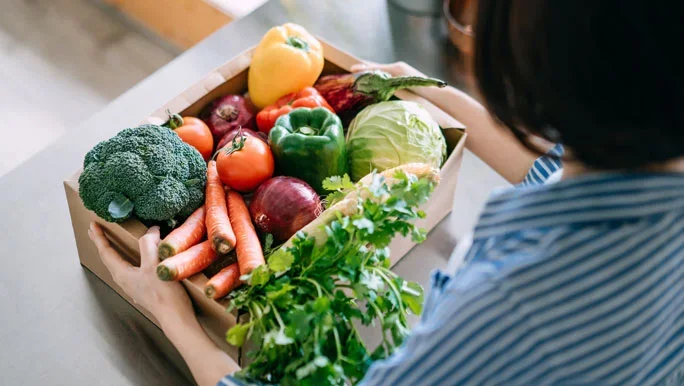What are the best vegetables for gut health?

Key points
- Vegetables are important in your diet because they contain dietary fibre to keep your gut healthier.
- Vegetables also contain prebiotics which help feed the good bacteria (AKA gut microbiome) in your intestines.
- That good bacteria aids to digest your food and absorb nutrients.
- Discover which vegetables may pack the most power when it comes to prebiotics.
We’ve all heard a balanced diet helps keep us healthier. Having a variety of vegetables is good advice, but many people don’t realise the extra benefits that those vegetables may have which also helps your gut health.
Registered Nutritionist, Sarah Gray explains why certain vegetables make up some of the best foods for gut health. She also discusses a few things we should try to avoid to keep our insides healthier.
What exactly is the gut microbiome?
We all have trillions of bacteria (known as microbiome) living in and on all different parts of our bodies. The highest concentration of these are in our intestines – the gut microbiome.
“These bacteria help you digest food and absorb nutrients,” explains Sarah. So, we need a balance of both to give us a healthier gut.
Knowing if your gut is healthy will depend on what your ‘normal’ is. Your body is good at giving you signs when there is an issue, which could include:
- stomach gurgling and gas
- constipation cramps
- diarrhoea
The type of poop you have could also give you hints on what’s happening on the inside. Colour, consistency and regularity may all tell you if your gut is happy and healthy.
If you have any concerns, it’s always best to talk to your health practitioner. But these signs could possibly be linked to your gut health needing some attention.

Vegetables make up some of the best foods for gut health.
Why are vegetables so good for gut health?
Vegetables are a good source of dietary fibre that may help bulk up your poop and absorb water to keep it moving smoothly through your intestines.
“Some vegetables have the added power of prebiotics which may help with the growth of certain ‘good’ bacteria in the gut,” says Sarah.
There are also other health benefits of vegetables, which make them not only a smart choice but also a nutritious one.

Ultra-processed foods are sometimes high in sugar and salt, and are usually low in fibre.
So, what are the best vegetables for gut health?
“Everyone’s microbiome is unique, much like your fingerprint,” says Sarah. And because of this, what makes a food the ‘best’ will depend on your unique system. Speak to your GP, a Registered Nutritionist or Accredited Practicing Dietitian for advice as unique as your microbiome.
In the meantime, some examples of foods Sarah suggests may assist with gut health:
- Jerusalem artichokes – this root vegetable is high in inulin which may help gut bacteria get your digestion moving and reduce constipation.
- Onions – also a good source of inulin, they could add FOS (fructo-oligosaccharides) that may help stimulate good bacterial growth.
- Chicory – when ground up it could be used as a sweetener and a source of dietary fibre which feeds the microbiome. Studies are showing that a roasted version of chicory could potentially help control blood glucose levels.
- Garlic – may help increase the growth of a good bacteria called L. acidophilus, which lives in your gut.
Focusing on what vegetables are in season now when making your weekly family meal plan is a good way to start increasing your vegetable intake. An easy way to include foods to improve gut health is you could try adding one more vegetable to your favourite recipe.
You could also consider the benefits of fermented foods in addition to fresh vegetables, especially for gut health.

Garlic may help increase the growth of a good bacteria called L. acidophilus.
What’s best to avoid for good gut health?
You might be hoping for a list of the worst foods for gut health, but Sarah says “There is no blanket list of foods to avoid. With the support of your health professional, an elimination diet will help you to remove and re-introduce potential food triggers over time.”
These trigger foods could be different for everyone, which is why it's best to seek professional help.
Sarah suggests a few things to consider:
- Ultra processed foods that are high in sugar and salt are usually low in fibre: Instead of reaching for that bag of chips, try a platter of crunchy vegetables and a hummus dip.
- Artificial sweeteners are thought to increase some of the bad bacteria in the gut: Swap the sweet treats for a green smoothie with chopped up apple for a touch of sweetness.
- Keep a food diary and note any trigger foods that cause symptoms such as diarrhoea or constipation - show this diary to your health professional.

Keep a food diary and note any trigger foods that cause symptoms such as diarrhoea or constipation.
Food choices for a healthier gut
By making positive gut health food choices, you may be on your way to improving your overall health as well as your gut health.
The good thing about it is that it doesn’t have to be hard. Start with one new vegetable a week and you could soon be eating a whole rainbow of gut health foods.
Related:
- Let's talk about bread and the immune system
- 10 healthy snacks to keep in your cupboard
- How to create a meal plan and stick to it
Sarah Gray is both a Registered Pharmacist and Registered Nutritionist with a particular interest in health education and helping people to take small steps to big change in their health journey. Sarah is the Head of Health and Nutrition on the healthylife Advisory Board.
Reviewed by the healthylife Advisory Board September 2021.